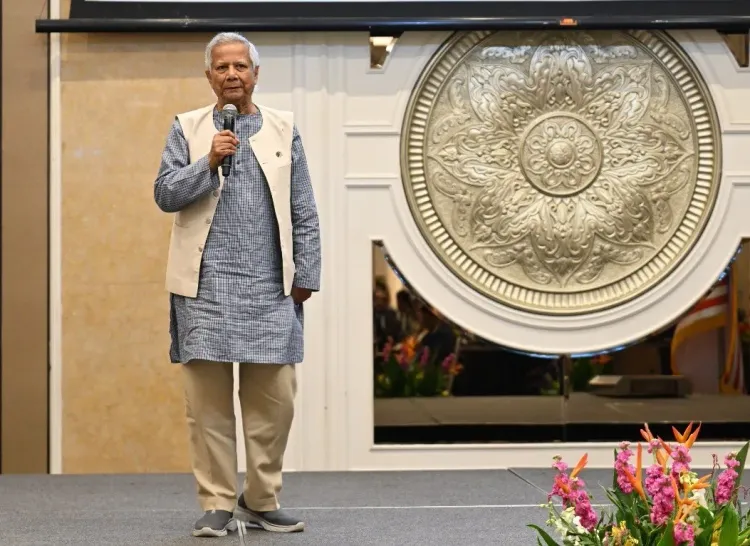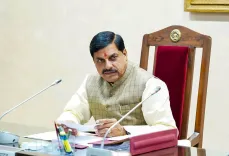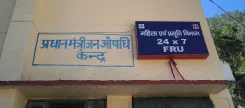Is Bangladesh Really Descending into Chaos Under Yunus's Leadership?

Synopsis
Key Takeaways
- Sheikh Hasina's removal has led to increased political repression.
- Muhammad Yunus pledged reforms that remain unfulfilled.
- A surge in violence and arbitrary arrests characterizes the current regime.
- Minority communities are facing rising violence and harassment.
- The future of democracy in Bangladesh remains uncertain.
Dhaka: It has been a year since Sheikh Hasina was removed from her extended position as the Prime Minister of Bangladesh on August 5, 2024, following a large-scale uprising. Just days after her departure from the country, Nobel Laureate Muhammad Yunus took on the role of Chief Advisor to the interim government on August 8, vowing to implement significant reforms and usher in a new chapter of freedom and democratic renewal. However, 12 months later, the situation is starkly different from that initial promise. Anarchy and violence—inflicted by both security forces and non-state entities—combined with a disregarded reform agenda and rising authoritarianism, have overshadowed the nation's future.
A report by Human Rights Watch (HRW) released on July 30 details the shortcomings and intentional excesses of the interim government. The Yunus-led administration, which had vowed to move away from the enforced disappearances and political oppression characteristic of the Hasina administration, now appears to be an instrument of political retaliation.
In a notable decision, the government prohibited the party that spearheaded Bangladesh's liberation struggle against Pakistan in 1971. This was soon followed by a surge of arbitrary detentions targeting Awami League (AL) supporters and other political adversaries. The crackdown became especially visible after the clashes on July 16 between security forces and pro-AL activists, resulting in hundreds of arrests and 10 murder cases filed against over 8,400 individuals.
According to the report, from August 6 to September 25, 2024, more than 92,000 individuals were charged, with the majority facing murder accusations, including Hasina, 390 former ministers, members of Parliament, advisors to the Prime Minister, city mayors, and others.
In a glaring instance of power abuse, former mayor of North Dhaka, Mohammad Atiqul Islam, has been in custody since October 2024 facing over 60 separate cases of murder and attempted murder, with 36 of these charges occurring while he was not even present in the country.
Furthermore, in an attempt to apprehend alleged criminal gangs associated with the Hasina administration, security forces have detained over 8,600 individuals since February, under what is termed ‘Operation Devil Hunt’. The HRW concludes that many of these arrests, largely targeting AL supporters, appear to be politically motivated and arbitrary.
Regarding the anticipated systemic reforms, 11 reform commissions were established in 2024, focusing on the election commission, judiciary, and police. Despite the initial enthusiasm surrounding the recommendations, which appeared groundbreaking on paper—such as ensuring the complete independence of the judiciary from the executive and forming an independent police commission for accountability—the practical execution of these reforms remains elusive.
Analysts have identified multiple barriers to the implementation of these reforms. However, a critical examination of the interim government’s exercise of power in its retributive politics suggests that the stagnation of systemic reform is more a strategy than a failure.
Additionally, the reform commissions themselves have faced substantial criticism concerning their lack of inclusivity and transparency. Predominantly comprised of Bengali Muslim men, these commissions reflect a troubling absence of diversity and representation in terms of religion, ethnicity, and gender, raising questions about the interim government’s sincerity and intentions.
In an August 4 report by the New Delhi-based Rights and Risks Analysis Group (RRAG), post-Hasina Bangladesh experienced a staggering 230 percent rise in assaults on journalists, with nearly 900 journalists attacked between August 2024 and July 2025. This period also witnessed a 558 percent increase in criminal cases against journalists, underscoring the oppressive atmosphere confronting the press under the interim government.
Simultaneously, it is well-documented that religious minorities, particularly Hindus, have encountered escalating harassment and violence since Sheikh Hasina’s removal, a fact the interim government has dismissed as mere political violence rather than communal strife. The largest minority organization in Bangladesh, the Bangladesh Hindu Bouddho Christian Oikyo Parishad, disclosed last month that the first half of 2025 recorded a total of 258 incidents of communal violence against minority communities, including 20 rape cases and 59 assaults on places of worship.
Moreover, the HRW report highlights rising hostilities against women’s rights activists, LGBTQ+ individuals, and indigenous communities in the Chittagong Hill Tracts, instigated by both state and non-state actors, including Islamist extremists.
Clearly, what was once heralded as the dawn of a new era for Bangladesh has devolved into an unrestrained plunge into chaos—marked by abuses, broken promises, and escalating disillusionment. Although elections are slated for February 2026, given the interim government’s patterns, it remains uncertain whether and how these elections will occur.
By now, the populace of Bangladesh has likely learned a bitter lesson about placing excessive faith too rapidly and cannot afford to lower their defenses again. Concurrently, the international community must sharpen its focus on Bangladesh, which sinks deeper into turmoil and authoritarian rule with each passing day.









